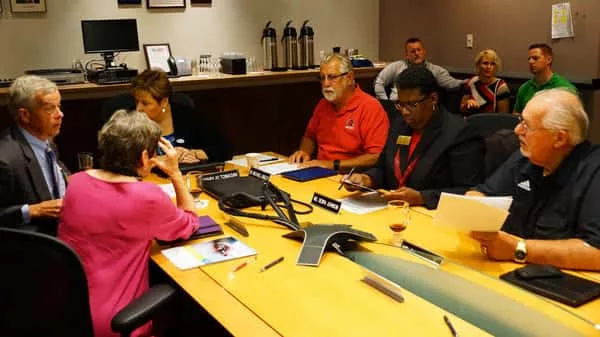"This is the community's college. This is our college. We need to give the community an opportunity to show their pride in what we've done here and what we've been able to do in supporting this institution since 1960." With that being said, Lake Michigan College Board Trustee Paul Bergan supported a motion from his colleague Judy Truesdell to place a 10-year millage vote on the November ballot for .48 mill for facility improvements at all LMC campuses.
In an 11-minute board meeting today on the college's Napier Avenue Campus, the Board of Trustees heard from a Citizen's Task Force and then voted unanimously to seek the millage campaign this fall to protect the institution's assets and enhance the learning experience.
After being excoriated by a retiree from Eau Claire for "sitting on your fancy chairs, and using your fancy glassware," while those on a fixed income struggle to get by, and cautioned by a neighbor not to get too crazy with additional surveillance cameras, the board heard from attorney and real estate developer Mike Cook of St. Joseph on behalf of the Citizens Task Force which met multiple times to review the needs of the college and the options for solutions. Cook told trustees, "Based on information presented in great detail to the citizen's task force, the members of the task force recommend to the LMC Board of Trustees that it is in the college's best interest, and the communities that it serves best interest, to put forward on the November 2016 ballot, a capital millage request of .48 mill over 10 years to address high priority facility improvements at LMC's campuses."
Cook went on to note, "The Citizen's Task Force recommends the college's proposed use of the proceeds be restricted to capital expenditures used to modernize instructional and workforce training spaces, expand and enhance student support service areas, address safety and security improvements and make efficiency upgrades and other building improvements to extend their useful life."
Cook also says that the task force recommends that the board "appoint a citizen's oversight committee whose purpose would be to ensure the proceeds are spent accordingly."
In making the motion, Truesdell said, "It doesn't matter if you are in your home or in your business…we have to protect our assets."
Bergan said, "We want to keep it as a point of pride, and not have it dilapidated and falling down." He added, "This is not about kids. This is about adults. This is about re-training. This is about workforce. This is about opportunity, and this is about future."
Trustee Stephen Small raised two points. "I hope when this passes that the college raises enough revenue so as to avoid raising tuition and fees for the duration of the millage," and he also hopes that voters north of the Berrien County line will show their support "on the good faith assumption" that voters south of the county line will reciprocate should the need be undertaken at the South Haven campus in the future.
The college's acting CEO & President Emeritus Dr. Bob Harrison tells me, "I think it's the right step for the college to take. The issues regarding the facilities won't go away. We have no reason to expect an infusion of cash from the state. We will get a capital outlay grant, but that took us almost 15-years to garner, so this will position the college to make immediate improvements on all the campuses, and also give a good strong foundation, so that there won't be issues facility-wise in the coming years."
Board Chair Mary Jo Tomasini says, "I'm very pleased. I think that the Citizen's Task Force did great work putting together an understanding of what we needed for the community and we're very pleased with the work they did." She adds that the priorities of the millage, if approved, will be to "maintain what we have. We have aging infrastructure, and just the heating & cooling improvements are going to save hundreds of thousands of dollars a year." She adds, "Student safety is always something that we are always working to improve."
The millage is the final step in a multi-phase approach to raising as much funding as possible toward priority projects before relying on taxpayers. The college has raised almost $7.5 million in private and public donations in support of the Hanson Technology Center and other projects, and plans to invest about $24 million of general fund monies.
A millage would help the college offset a reduction in state aid from 32% of LMC’s budget in 2001, to just 16% – the lowest on record. It would also help LMC to keep tuition low for students and families.
LMC’s explanation for the decision to introduce the proposal in November is based on an immediate need for improvements that will keep pace with labor market demand, new workplace and learning technologies and student expectations.
The urgency also stems from increasing construction costs and historically low borrowing costs. The longer the college waits to begin these projects, the more costly they will ultimately be.
Early polling by the college indicates voter support from LMC’s voter district, which includes Berrien County, South Haven Public School District and Covert Township. A general election will bring a larger voter turnout, meaning more people will have a voice in shaping LMC’s future. College representatives are confident in the benefits LMC provides to the region’s economy. National research estimates that every $1 invested in community colleges returns $6.80 gained in benefits to taxpayers.
LMC has never had a capital millage and it’s been 20 years since LMC received a new operating millage (0.25 mills in 1996). LMC’s current millage is the 24th lowest millage among Michigan’s 28 community colleges. Even if LMC passes a new millage as proposed, the college would still rank 21st in the State.
The issue will be placed on the November 8th ballot this fall throughout the college's service area. To learn more about the millage campaign, click the link below:






